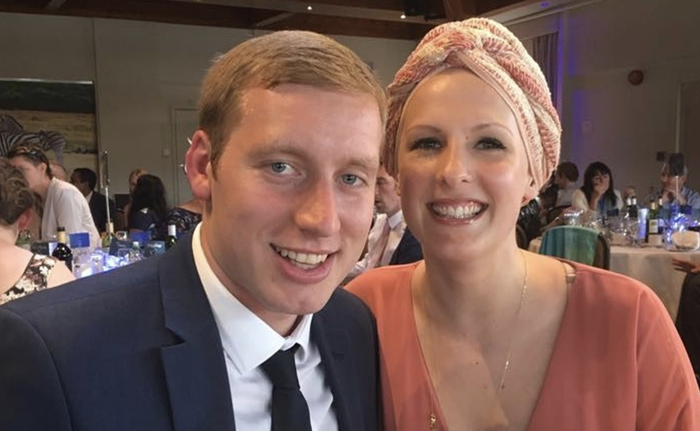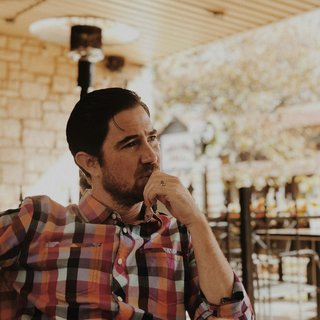Asking for help to work through chemo
Bianca, 35, was diagnosed in 2016 with Hodgkin lymphoma and had six months of chemotherapy.

Bianca, 35, was diagnosed in 2016 with Hodgkin lymphoma and had six months of chemotherapy.
I was able to have my chemotherapy as an outpatient, so I’d go into hospital every two weeks on a Friday morning and be out by the evening. I’d have Friday off work for the treatment and I’d usually take the Monday and Tuesday off as well. By the Wednesday, I was back at work. I was working reduced hours – 10am until 4pm.
But it wasn’t like I was in work ten till four all the time – my employer was really flexible when the side effects became tough to deal with. They were cumulative, so as I started getting further down the line with chemo, the tiredness and the nausea all really kicked in.
Flexibility and support
If I was feeling poorly, I had a clinical nurse specialist who I could call. Because my employers were flexible and the hospital was so near, I could go in and get checked over and, sometimes, go back to work.
I don’t think I could have worked if I hadn’t lived so close, because walking and transportation were a bit of a nightmare – I was exhausted. The year after I was diagnosed, the whole company moved to laptops and hot-desking, and I think that working from home could have really helped.
My advice to others would be explore agile working if you can.
Maintaining a sense of normality
I wanted to keep working as I was living in a house-share at the time, so sitting around at home wasn’t ideal. I wasn’t near family either, so I wanted to do it to keep that sense of normality – otherwise I would have gone mad. It did mean that when I got home at 4pm, that was it: my social life was null and void – and that was really challenging.
Communicating with my boss and colleagues
I told my manager the day I was diagnosed. It was difficult as I’d only been there for a month. But I sat down and said, “Look, I haven’t been feeling very well. I didn’t think it was anything serious, but I’ve just been given this diagnosis and I’m going to be having chemotherapy for six months. I want to work as much as possible during this time. What are the next steps?” I was so lucky that they said, “Do whatever it is that you need to do – we’ll support it.”
I was managing a team of four at the time, and I was brand new. I didn’t want lots of secrecy and murmurings of “Where’s the new girl gone?” – so I was upfront with them and they were really good about it.
You don’t have to do it on your own
My biggest learning was that although I am only one person, I had a whole team behind me. That is what they are there for – you don’t have to do it all yourself. I had to just delegate things – if I couldn’t make a meeting, they’d take notes. On one occasion, I wasn’t feeling particularly great and one of the girls said, “I’ll just come to your house and we can have the meeting there.” That saved a whole lot of hassle.
There were moments when I was really unwell. I remember going in once and just breaking down in front of my manager. It was pretty awkward. I was just sobbing and saying, “I feel so poorly – I feel like I’m failing at my job.” But it was his job to pick that up. He was my manager – he needed to figure out how he was going to support me.
You physically can’t do everything – it’s ok to ask for help, it’s ok to tell people that you’re not coping, and it’s ok to let them support you.
Life after treatment
I’m still living with the effects of chemotherapy, physically. Even now, three years down the line, I have bouts of fatigue, which completely wipe me out. And my immune system’s shot to pieces.
A couple of years back, over the course of a year I had about five weeks off work sick with colds and the flu. My manager questioned why I’d had so many days off sick, but it was all ok once I explained that it’s a side effect. And luckily my records were with HR, including a letter my clinical nurse specialist had written.
The emotional impact has also taken its toll. I’ve had counselling, which has helped. Now I have a good work-life balance. If I’m having a really crap day and I feel poorly, I’ll tell them, and I’ll just go home.
I appreciate my personal time so much more and am a big advocate of trying to get out of the office no later than half past six. I want that time at home with my husband – work will still be there the next day.
Janssen-Cilag Ltd has supported Blood Cancer UK with funding for the production of this web page and others within the ‘Living well’ section. It had no influence over the content.

Share your story about living well
Your experience can help others with blood cancer

